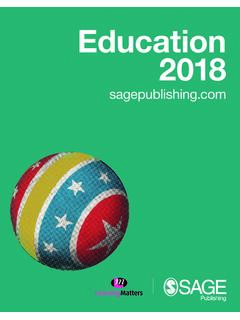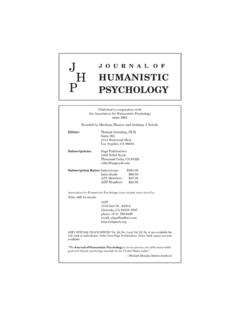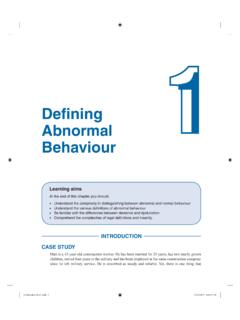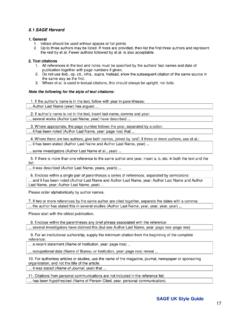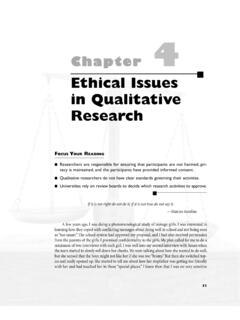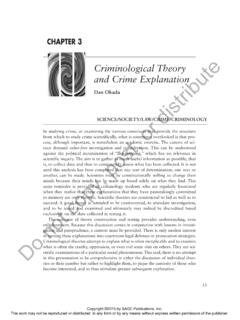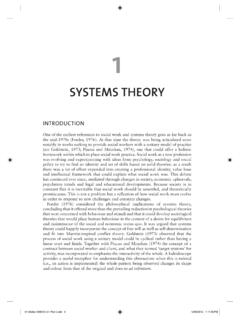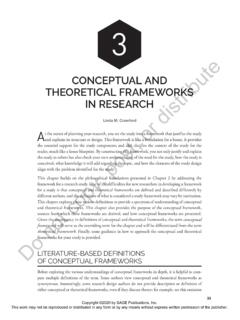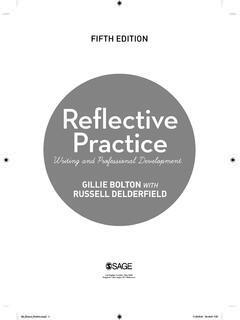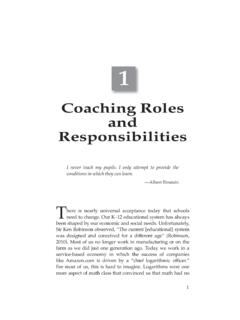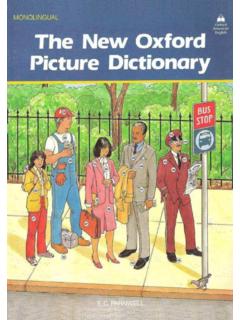Transcription of Doing Your Early Years Research Project
1 Doing your Early Years Research 16/24/2014 11:25:10 AMEducation at SAGE SAGE is a leading international publisher of journals, books, and electronic media for academic, educational, and professional markets. Our education publishing includes: accessible and comprehensive texts for aspiring education professionals and practitioners looking to further their careers through continuing professional development inspirational advice and guidance for the classroom authoritative state of the art reference from the leading authors in the out more at: your Early Years Research Project A Step-by-Step GuideThird EditionGuy 26/24/2014 11:25:10 AMDoing your Early Years Research Project A Step-by-Step GuideThird EditionGuy 36/24/2014 11:25:10 AMThis book is dedicated to my dear brother Paul Pablo Christopher Roberts-Holmes. Paul s love, warmth, humour and passion for life are greatly missed by all who knew him.
2 August 2nd 1964 February 5th Publications Ltd1 Oliver s Yard 55 City RoadLondon EC1Y 1 SPSAGE Publications Teller RoadThousand Oaks, California 91320 SAGE Publications India Pvt LtdB 1/I 1 Mohan Cooperative Industrial AreaMathura RoadNew Delhi 110 044 SAGE Publications Asia-Pacific Pte Ltd3 Church Street#10-04 Samsung HubSingapore 049483 Editor: Marianne LagrangeAssistant editor: Rachael PlantProduction editor: Nicola MarshallCopyeditor: Audrey ScrivenProofreader: Emily AyersIndexer: Silvia BenvenutoMarketing manager: Lorna PatkaiCover design: Naomi RobinsonTypeset by: C&M Digitals (P) Ltd, Chennai, IndiaPrinted and bound in Great Britain by Ashford Colour Press Ltd Guy Roberts-Holmes 2014 Reprint dates: 1st edition was published 2005, reprinted 2007, 2008, 2009 twice, & 2010. 2nd edition was published 2011, reprinted 2012 & third edition published from any fair dealing for the purposes of Research or private study, or criticism or review, as permitted under the Copyright, Designs and Patents Act, 1988, this publication may be reproduced, stored or transmitted in any form, or by any means, only with the prior permission in writing of the publishers, or in the case of reprographic reproduction, in accordance with the terms of licences issued by the Copyright Licensing Agency.
3 Enquiries concerning reproduction outside those terms should be sent to the material on the accompanying website can be printed off and photocopied by the purchaser/user of the book. The web material itself may not be reproduced in its entirety for use by others without prior written permission from SAGE. The web material may not be distributed or sold separately from the book without the prior written permission of SAGE. Should anyone wish to use the materials from the website for conference purposes, they would require separate permission from us. All material is Guy Roberts-Holmes, of Congress Control Number: 2014931160 British Library Cataloguing in Publication dataA catalogue record for this book is available from the British LibraryISBN 978-1-4462-8593-0 (pbk)ISBN 46/24/2014 11:25:11 AMThis book is dedicated to my dear brother Paul Pablo Christopher Roberts-Holmes.
4 Paul s love, warmth, humour and passion for life are greatly missed by all who knew him. August 2nd 1964 February 5th 56/24/2014 11:25:11 66/24/2014 11:25:11 AMContentsAbout the Author xiAcknowledgements xiiForeword xivGlossary xvi 1 You Can Do Research ! 1 your feelings about Doing Research 2 Myths about Early childhood Research 3An inclusive approach towards Early childhood Research 4 your Research Project within Early childhood studies 5 The professionalisation of Early childhood studies 6 The importance of your reflective practice 7 Principles of high-quality Early childhood Research 13 The Research process within Early childhood studies 17 Everyday Research skills 192 your Research Story, Methodology and Research Questions 22 Reflecting upon your personal story 23 Methodology 23 Some Research stories 24 your reflective diary 28 High levels of motivation 29 Professional motivations 30 Focusing on your area of interest 31 The overall Research questions and field questions 34 Getting your Research questions right.
5 Breadth and depth 35 Doing a pilot study 373 Ethical Issues in Early Childhood Research 41 Legislation and the participatory rights of children 42 Sociology and the participatory rights of children 43 Children s participation and protection 44A reflective impact assessment of Research on children 45 your emotional vulnerability 46 Informed consent 49 Informed consent, confidentiality and child protection 76/24/2014 11:25:11 AMviii Doing your Early Years Research PROJECTI nformed consent leaflet for children 51 Socially inclusive and respectful relationships with children 54 Informed consent is an ongoing process 57 Negotiating access with the gatekeepers 57 Feedback and closure of the Research 64 Ethical dilemmas are hard to resolve 65 Ethical checklist 66 4 Designing your Research 69 What is Research design? 70 Two Research approaches 71 Quantitative Research 72 Qualitative Research 72 Sampling within your Project 73 Triangulation and validity 74 The quantitative and qualitative approaches: an example 76 Action Research 78 Action Research belongs to you 80 Case studies 84 Small-scale qualitative surveys 86 Broad and deep Research 87 Justifying your methods 88 your Research proposal 89 5 Observation: Looking and Listening 94 Why do observations?
6 95 What is observation? 96 Interpretation 96 Being open in your looking and listening 97 Knowing the context of your Research setting 98 Unstructured observations 100 Structured observations 100 Tally counting 101 Observation schedules 102 Event sampling and running records 105 Video observations 106 Observational diagrams 107 Participant observation 108 6 Creative Listening with Young Children 111 Developing cultures of meaningful participation 112 What is creative listening? 86/24/2014 11:25:11 AMCONTENTS ixThe Mosaic approach 116 Cameras and ethics 118 Children s photographs and walking tours 119 Children s drawings 124 Children s interpretations of their pictures 125 7 Interviewing Children and Adults 132 Types of interview 133 The interview guide 133 Probing 134 The differences between an interview and a chat 135 Focus group conversations with children 136 Children as researchers 142 8 Writing and Using Questionnaires 151 Three ways to administer your questionnaires 153 Ethical issues and questionnaires 154 Writing your questionnaire 158 Types of question 159 Writing a Likert scale questionnaire 160 9 Presenting and Analysing your Findings 165 Reducing your data 166 Reducing and displaying your data 171 Using Excel and NVivo software for
7 Analysis 172 Inducing and/or deducing the themes and topic codes 174 Using a wide range of data in your analysis 17510 Writing your Literature Review 185 Why you should do a literature review 186 Read widely 186 Developing your own point of view 187 What you should read and include in your literature review 189 Using your college/university online databases 191 Using the British Education Index (BEI) 193 How to read a really useful article 194 Synthesising the ideas 197 Write, edit, re-edit and re-re-edit! 19711 Writing up your Research Project 200 The steps before your Research Project 201 your supervisor 96/24/2014 11:25:11 AMx Doing your Early Years Research PROJECTYour responsibilities 204 your supervision meetings 204 The contents of your Research Project 205 Title page 206 Acknowledgements 207 Abstract 207 Table of Contents 208 Chapter 1: Introduction and Literature Review 210 Chapter 2: Methodology 213 Chapter 3: Findings 215 Chapter 4.
8 Discussion and Conclusions 219 References 222 Appendices 223Be careful to avoid plagiarism 223 Final preparation and proofreading 224 References 227 Index 106/24/2014 11:25:11 AMAbout the AuthorIn the 1980s and 1990s Guy Roberts-Holmes worked as one of a handful of male nursery and reception teachers in inner London primary schools. Guy thoroughly enjoyed this challenging experience and was eager for more insight into the wider context of Early Years education, and so completed a Master s degree at King s College, London. Guy then worked in The Gambia, West Africa, for Voluntary Services Overseas (VSO), as a lecturer at The University of The Gambia.
9 Whilst in The Gambia, he carried out an ethnography of a nursery and primary school, leading to a PhD at the University of Nottingham. Guy is the Programme Leader for the internationally renowned MA Early Years Education at the Institute of Education, University of London. His Research interests include policy sociology, Early Years assessment, young children s digital learning, and the professionalisation of the Early Years 116/24/2014 11:25:11 AMAcknowledgementsThank you to my wife Pamela for her love, support and encouragement for this latest edition ! The book continues to be inspired by my fantastic children Justin, Pia and Isabelle, and their wonderful cousins Lucinda, Rose, Mary, Oliver, Jane and Tom. My life has been so enriched by these creative, precious and wonderful young people, and I am forever grateful for their playfulness, intelligence and resilience.
10 Thank you to the Canterbury Christ Church University Early Childhood Studies students who shared their Research projects with me: Shelley Angel, Lisa Burnap, Gemma Cook, Stephanie Dennehy, Katherine Gough, Martyn Kitney, Eleanor MacDonald, and Georgina Moxon. More recently, thank you to the Institute of Education, MA Early Years Education students Anthony Leete, Eleanor Rea and Michelle Palser whose dissertations are author and publisher are grateful for permission to reproduce the following material in this book:Figure from L. Blaxter, C. Hughes and M. Tight (2001), How to Research , 2nd edition , Open University Press/McGraw-Hill Publishing from P. Clough and C. Nutbrown (2007), A Student s Guide to Methodology, Sage , and from Y. Lancaster and V. Broadbent (2010), Listening to Young Children, Open University Press/McGraw-Hill Publishing from A.
